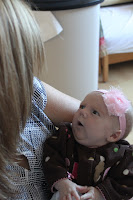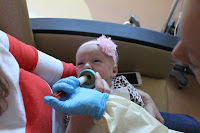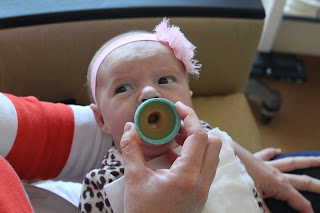June made some significant gains this week.

Weight is no longer an issue for June! Within four days she went from eight pounds, one ounce to nine pounds, two ounces. June's nurse had to weigh her twice just to make sure it was right. As of now, June weighs nine pounds, ten ounces. For once in her life, June has rolls (and not because she is retaining water). She is still around the tenth percentile for her age and weight, but she is making gains. June was getting fish oil in her food to increase the calories in the amount of milk she receives per hour. This week they stopped giving her fish oil. She is still getting 28 milliliters of milk mixed with formula an hour, which is considered continuous feeds. As of Tuesday, June is also starting to eat by mouth! Surgery is concerned that even if there isn't any more blockage in her intestines, it may be starting to scar back over and close. Since June's J tube is fed through her stomach down past the repair to her duedum, that area isn't being used to keep it open. If there still in blockage, the small amounts of milk she is getting will start to add up over the next week, and she will eventually spit up like she did prior to her surgery to repair her intestines. They will then know that she will need to have more blockage repaired in addition to a more permanent J tube being placed.

On Tuesday, we gave her five milliliters. I held a bottle nipple while her nurse would squirt some milk from a syringe into the top of the nipple for her to suck on. It took her a little time to figure out how to get milk from the nipple. She also was fussy when she got milk since she has never eaten by mouth; she was not sure what to do with it. It took a lot of work for June to swallow the very small amount that we gave her, but she is learning how to eat by mouth, which she has never done in her 12 weeks of life.

We were able to feed her twice on Tuesday, but shortly after feeding her, the drainage from her wound vac increased. They stopped feeds for the day until surgery could be consulted on whether the increased drainage would further open the hole in her stomach. The doctors wanted her to continue trying to eat by mouth, so on Wednesday, we tried again. This time, she sucked on her pacifier while we squirted little amounts into her mouth by syringe. She handled the milk much better - almost seemed to enjoy it! Again, her drainage picked up, and even more this time, so they stopped feeds again.

On Thursday, we restarted feeding by mouth after her doctor rounded on her for the day. June's doctor wanted her to learn to use the bottle nipple instead of the pacifier, so we switched to an even slower flow nipple and tried again. During feeds, I had been holding her more upright to help her keep the milk down. Our nurse recommended repositioning her as if she were nursing, and she seemed to handle the milk better. Unfortunately, she struggled during her evening feeding. June now sleeps through the night (about six to seven hours) and most of the morning after surgery has seen her, so they didn't wake her to try eating by mouth. Today, once she woke up, we tried giving her five milliliters, and again, she struggled with eating. It almost seemed as if she were in pain once swallowing some milk. The doctor decided to up the amount of Prilosec (medication for her acid reflux) June is getting and try again tomorrow.

The other good news we received this week is that June is released from cardiology for the remainder of her stay (unless she is still in the hospital in three months). June still has two small holes in her heart, but they are staying the same size, so as her heart grows, in a sense, they are getting smaller. Her PDA hasn't closed either, but it is also small. The cardiologist is optimistic that June may not ever need surgery to close the holes, but because of the type of VSD she has, she will have a cardiologist for life. The heart can be very unpredictable, so they will monitor her to ensure the holes are not negatively affecting her growth. If her PDA does not close (which there is still a small chance it could) by three years of age, she will have to have it closed because if it is left open, it increases her risk for heart infection.
The ultrasound of June's kidneys still showed some mild blockage in one, but it is nothing they are very concerned about at this point. They will continue to monitor the blockage with another ultrasound next month. At this point, the blockage is mild so they do not need to treat it, just continue to monitor.

Keeping June's wound vac on continued to be a challenge this week. Unfortunately, every time it moves out of its placed location, the drainage leaks onto her stomach. The drainage is stomach acid, so it irritates her skin. The tape holding her temporary J tube in place loosens when the drainage leaks, and the J tube has started to come out. The J tube is a feeding tube with an IV connection (not typical at all). Every eight hours, the tubing needs to be changed out. A few times, the connectors have broken off, and the tubing needed to be cut shorter to attach a new connector. They will eventually run out of tubing on the outside of June's body if that continues to happen. If June looses that tube, we will not be able to feed her. With every dressing change of the wound vac, the J tube is also getting pulled on. Right now, the stitches that were originally holding the J tube into her stomach are about seven to nine centimeters away from their starting point.
We are five weeks and counting from June's last surgery. The doctors think that the hole in June's stomach continues to get smaller, but the doctors cannot really lay out a plan to get June on her way home until the hole closes. Initially, the hope was to have her "final" surgery six weeks after her fourth surgery; however, that doesn't seem like it will be happening anytime soon because they need to study her swallow and figure out if there is still blockage in her intestines. We cannot say the H-word (home) or D-word (discharge) for a while yet.










































































